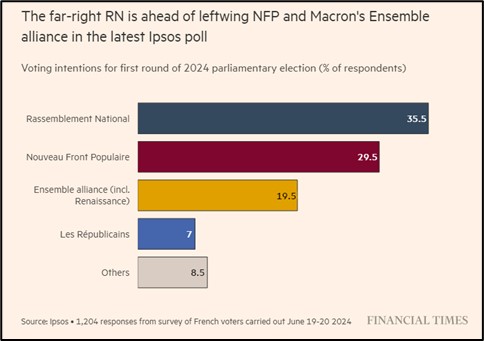Daily Comment (June 24, 2024)
by Patrick Fearon-Hernandez, CFA, and Thomas Wash
[Posted: 9:30 AM ET] | PDF
Our Comment today opens with a new antitrust suit by the European Union against US tech giant Apple. The suit suggests major US tech firms will be in the crosshairs of the EU’s new Digital Markets Act going forward. We next review several other international and US developments with the potential to affect the financial markets today, including new polling showing that the far right and far left are likely to dominate France’s parliamentary elections this Sunday and details on an ongoing cyberattack affecting US auto dealerships.
European Union-United States: The European Commission has accused US technology giant Apple of stifling competition on its App Store. The action marks the first major application of the EU’s Digital Markets Act, which went into effect in March and aims to keep big, powerful online platforms such as Apple’s from squashing competition from start-ups. If found guilty, Apple could face a fine of 10% to 20% of its global annual revenue, or tens of billions of dollars.
European Union-China: European and Chinese officials over the weekend confirmed that the EU and China have agreed to start talks over the growth of Chinese electric vehicles in the bloc, which EU officials fear will put legions of Europeans out of work. The talks aim to diffuse the EU’s planned antidumping tariffs against Chinese EVs, which are due to come into effect in July. At this point, however, we see no reason to think the talks could head off those tariffs.
France: Ahead of the snap parliamentary elections next Sunday, a new Financial Times poll shows 35.5% of voters intend to cast their ballot for the far-right populist National Rally, while 29.5% intend to vote for the new far-left alliance called New Popular Front. President Macron’s centrist Ensemble alliance, including his own Renaissance liberals, has the support of only 19.5%. As of right now, the figures suggest the runoff election on July 7 could pit the far right against the far left, guaranteeing a major change in France’s domestic policies.
Philippines-China: Satellite imagery shows the Philippine government has begun building an anti-ship missile base on the west coast of Luzon island, facing the South China Sea. The new base is aimed at deterring Chinese aggression against disputed islands and shoals in the area, including the Second Thomas Shoal, which we think is a particularly dangerous source of friction between China and the Philippines.
Russia-Germany: According to Western security officials, communication intercepts show that a fire last month at a Berlin factory owned by defense contractor Diehl was set by Russian saboteurs trying to disrupt shipments of critical arms and ammunition to Ukraine. Confirmation that the fire was an act of sabotage has prompted a call for similar incidents to be re-investigated for any link to Russia. Of course, such aggressive Russian attacks on NATO soil run the risk of worsening NATO-Russia tensions going forward.
Russia: Terrorists yesterday attacked a synagogue, two churches, and a police station in the restive North Caucasus republic of Dagestan, killing four civilians and 15 police officers. The attacks suggest Islamist militants could be taking advantage as the Kremlin shifts its attention and resources to the war in Ukraine and the fight to control political dissent.
US Cybersecurity: The cyberattack on auto dealership software provider CDK Global that started last week continued through the weekend, disrupting dealership business. Statements from CDK Global suggest the attack involved ransomware, in which the attackers shut down a system until a ransom is paid. The attack illustrates how specialized software for particular types of businesses have the potential to shut down large swaths of an industry.



